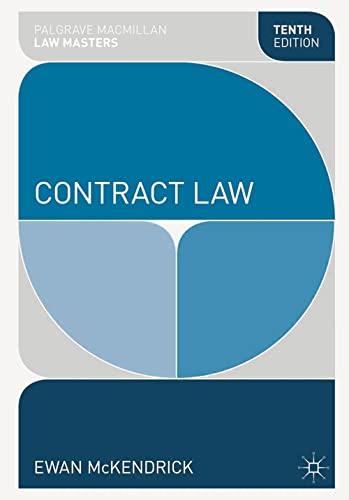Question
Part 1 - Knowledge The following questions are to assess your knowledge of the key concepts covered in this module. (Each questions are worth 3
Part 1 - Knowledge
The following questions are to assess your knowledge of the key concepts covered in this module. (Each questions are worth 3 marks each.)
- Briefly differentiate between the two key legal relationships, that being contract and tort, having regard to legal obligations.
- When we say that consideration is the price for a promise, what does price mean?
- Why is an intention to create a legally binding contract an essential element of a valid enforceable contract?
- Explain, with the use of examples, the concept of legal capacity.
- Explain the role of legality in the formation of a contract. What is the difference between an illegal contract and a contract against public policy?
- What is the different between a mistake and a misrepresentation?
- What is the difference between concepts of undue influence and duress? How does independent legal advice protect a party from a claim of either undue influence or duress?
- What are the various ways in which a party to a contract may break the contract?
- What is the distinction between a minor breach and a major breach and what are the consequences of each?
Part 2 - Application
The following questions are to assess your application of the concepts to practice based scenarios. (Each question is worth 3 marks.)
- On January 1, A and B enter into a contract under which B agrees to renovate A's house by September 1 for $60 000.00. By June 2, B has not yet started the renovations and A is getting worried, so A tells B that he will pay him an extra $5000.00 if B completes the renovations on time. When the job starts, A says, "I'll pay you an extra $5000.00 if you fix that cracked board in my fence. B completes the job by September 1 including the repair to the cracked board.
What is the total consideration owed to B? Justify your answer.
- Allen is Harry's older brother. Yesterday, Allen asked Harry, an experienced plumber, to fix a leaky pipe below the sink of Allen's main floor washroom. Knowing that Allen had just lost his job and wanting to help him out, Harry did the work, which took him almost half a day to complete. The next day, Harry and Allen had an argument, and in anger Harry told Allen he expected to be paid for his work. Is there an enforceable contract here? Why or why not?
- On January 1, Jack, who is 17 years old orders some computer software programs from a computer company. Jack needs the programs for school. The software programs cost $4000.00. On January 5, just before the computer company sends the software programs out, Jack has a change of heart. Can Jack get out of the contract? On what basis? Is there any argument that can be used to enforce the contract against Jack?
- Mary, a prostitute, enters into a contract with a client to provide sexual services in return for an agreed-on amount of money. Has an enforceable contract been made between Mary and the client? Why or why not? What remedies are available if either party fails to perform their obligations?
- A has two Corvette Stingray automobiles, one built in 1965 and the other built in 2009. Both cars are worth approximately the same amount (about $70 000.00). A now wants to sell the 1965 Corvette and to this end begins negotiations with B, who knows that A owns both a 1965 and a 2009 Corvette. In discussions with B, A says "I'm thinking of selling my Corvette for $65 000.00." B believes A is talking about his 2009 Corvette, so B says, "I'll buy it at that price," and pays A the $65 000.00. Later A calls B asking him when he is going to pick up the 1965 Corvette. Having thought that he was buying the 2009 Corvette, B now tells A he wants his money back. Is this enough to void the contract? Why or why not? What remedies will the court impose if the contract is void?
- Danny agreed to sell a large painting to Mary for $5000. It has a sentimental value to Marybeing a painting of her house in 1938. Before delivery, Danny discovered the sentimental interest of Mary and refused to sell it at the agreed-upon price. What type of breach is this? Would Mary be entitled to damages or specific performance? Why?
Part 3 - Critical Thinking
The following question is to assess your understanding of the broad strokes of the unit material. Answer the questions posed fully, using the material covered as well as your own analysis. It is worth 5 marks.
- Once a plaintiff proves that there was offer, acceptance, and consideration for the promise, the court will presume an intention to create legal relations. The court will also presume that that the parties have the capacity to make the contract, and that the contract is legal. Which of these six elements of a contract, is, in your opinion, the most important and why?
Step by Step Solution
There are 3 Steps involved in it
Step: 1

Get Instant Access to Expert-Tailored Solutions
See step-by-step solutions with expert insights and AI powered tools for academic success
Step: 2

Step: 3

Ace Your Homework with AI
Get the answers you need in no time with our AI-driven, step-by-step assistance
Get Started


